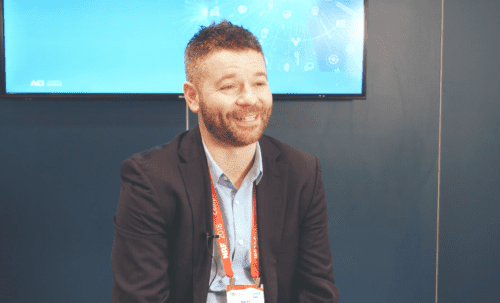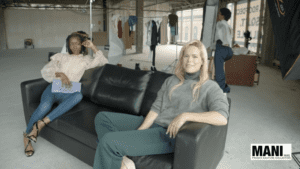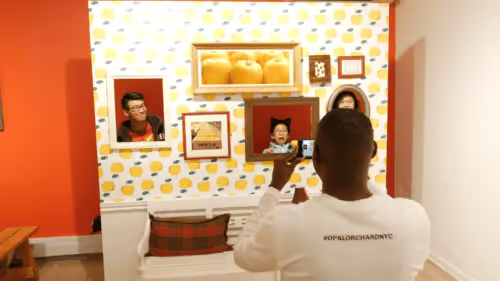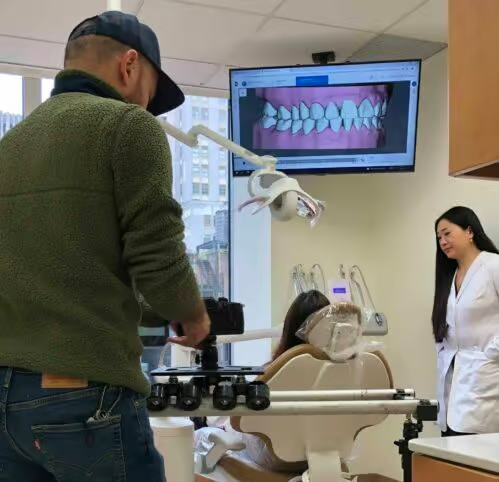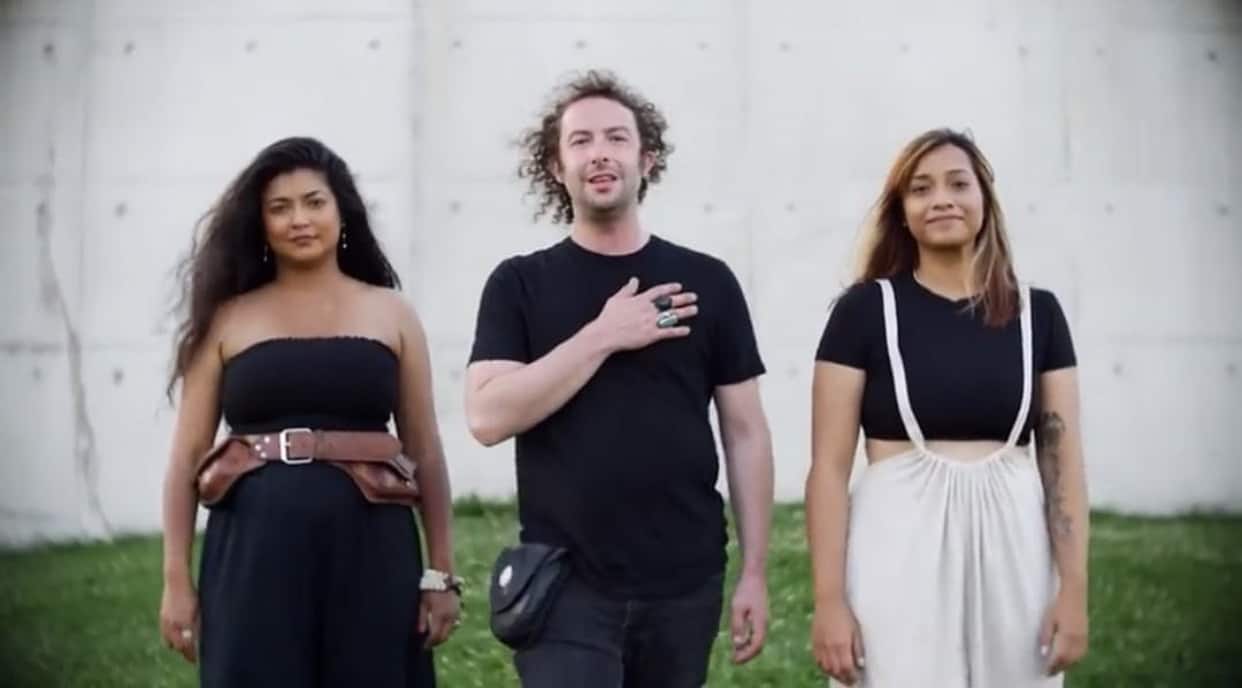A great interview has the power to inspire, persuade, educate, build trust and strengthen connections to audiences.
Through on-camera interviews, people can tell their story in their own words – while also sharing the story of their brand, project or vision. And visual storytelling is a powerful medium to connect with audiences. It resonates more deeply than with text alone.
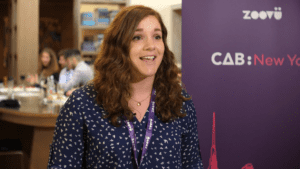
Interviews are used for myriad purposes. Examples include: journalism, podcasts, documentaries, recruiting videos, and videos for businesses and nonprofits. As a video production company, we create videos with interviews for a variety of clients (including corporate clients, artists, documentarians and more).
A captivating interview will leave your viewers with a memorable and favorable impression of you and your brand. On the flip side, some interviews leave the viewer feeling bored, confused or frustrated.

In this article, I’ll outline tips that will help interviewees AND interviewers to optimize this experience. These tips can also help people who coordinate video interviews for their team members.
To begin, here’s an outline of the topics we’ll cover:
- Types of videos that feature interviews
- Benefits of interviews (especially great interviews!)
- How the goals of your video influence the questions + answers
- Tips for interviewees
- Tips for interviewers
- Examples of interview questions
The types of videos that typically feature interviews include:
- Business and corporate overview videos
- Testimonials and customer success stories
- Talent recruitment videos
- Brand stories or “the story behind the brand”
- Meet the CEO / artist / team etc
- Expert testimonials and educational videos
- Announcements about a new product / service / location etc
- Documentaries and mini-documentaries
- Fundraising videos
- The list goes on! For an extensive list of video types, check out our post on this topic.
The following list comprises the benefits of interviews for your videos. Great interviews can:
- Enhance trust by introducing the person or people behind your organization
- Express your brand’s personality + company culture
- Build relationships by humanizing your company / nonprofit / brand
- Answer questions about your product / service
- Explain topics more effectively (especially helpful for visual learners)
- Boost credibility and showcase your expertise
- Position yourself / biz as a trusted source of industry knowledge
- Build community around shared goals + values + interests.

Consider the following questions about the goal(s) for your video. You can structure the interview questions so the answers include your key messages. Is the goal of your video to:
- Build brand awareness?
- Reach current or potential customers?
- Tap a new market in a new city – or reach customers nationally or globally?
- Position your company / org as experts in your field?
- Teach your audience something or answer questions?
- Drive customers to your website and land sales/clients?
- Improve the reputation of your business in the community?
- Educate / inform / inspire your audience about a specific topic? This applies to all sorts of videos, including documentaries, mini-docs and corporate videos.
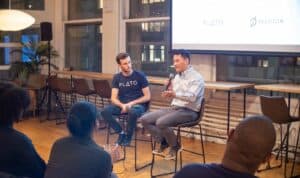
- First determine the best candidate(s) to be interviewed for your video based on your goals and target audience, ie a CEO / client / expert etc.
- Prepare questions + answers beforehand to consider the messages you want to convey in the video. A videographer or video production company can also prepare questions prior to the shoot. It helps to work backwards from your goal for the video, ie what key messages do you want the viewers to remember? What action(s) do you want them to take after watching your video? And so on.
- Many times it helps to rehearse your answers, but during the interview, try to let the answers flow organically. A good interviewer will help with this.
- Aim for a natural and conversational interview, whenever possible. Appearing relaxed and confident is generally preferred – as opposed to appearing overly-scripted and rigid.
- Ask the videographer or video production team if you should repeat the questions in your answer. This can help with the editing process.
- If the interview is recorded (and not a live broadcast), you can repeat answers. So don’t worry about screwing up. A good interviewer will draw out the best in you. And editing in post-production can work magic as well.
- Try and connect with your audience on a personal level, even as you’re speaking to the interviewer or camera. Be mindful of your eye contact, body language and posture. Also remember your worth and embody that confidence!
- Authenticity is desirable. It’s not always easy to be authentic, but try and allow yourself to shine through. It will deepen connections to your audience and enhance trust.
- For tips to look + feel great on camera, check out our blog on this topic.
- For tips on live broadcast interviews (for news etc), it can be very helpful to receive media training or watch videos on YouTube on this topic.
15 tips for interviewers to conduct top-notch interviews:
- Try to put the interviewee at ease. Some people have loads of on-camera experience, while others are new to this process – and are naturally nervous. Your guidance and support will help them shine!
- Sometimes it helps to conduct a pre-interview over the phone (or in person) before the video shoot. Establishing rapport – before the camera starts rolling – is key.
- You may want to provide the interviewee with questions (or an outline of topics) beforehand so they can prepare. Other times, it’s best to film an interview that’s more spontaneous – to capture responses that are less scripted. Decide which direction is best for you and/or the client.
- Ask open-ended questions – so the person can’t simply answer “Yes” or “No.” Ask something like, “How did it feel to accomplish that goal?”
- Keep the questions simple and direct. Don’t ask two questions at once. People will often forget the second question and possibly get confused.
- Listen. Truly listen. It’s very easy to get distracted nowadays, but listening to the interviewee’s answers will help guide the interview in a smooth way. The interviewee will also feel more comfortable during the process.
- Try to evoke emotional and inspirational responses (when appropriate). Viewers will feel more connected and the messages will be memorable. “What did it mean for you and your team to accomplish such a huge undertaking?”
- With your questions, aim to highlight the goals + personality + values that your client wants to share with their audience.
- Be specific about how the person should introduce themselves and their title / biz / org. It can be easy for an interviewee to stumble during this part.
- Have things on hand to make the interviewee more comfortable, like water and blotting paper (to remove sheen from the skin).
- You can show the interviewee how they look / sound in the monitor and adjust if needed.
- Consider the person’s attire (and possibly offer advice before the shoot) when choosing the background for the video shoot.
- Minimize distractions while filming on the set. This includes extra people, sounds and busy imagery in the background (unless it’s purposeful). This will also help the interviewee stay focused while answering your questions.
- Tell the interviewee where to look while answering questions: is it at you or the camera?
- Assure the interviewee that you can film multiple takes if needed. So they can relax a bit more, since there’s no need for perfection!
15 questions that are great for corporate videos, brand stories, documentaries and more:
- What is your role at your biz / org?
- What makes your brand / business / artistry unique?
- What does your company offer that your competitors don’t?
- What value does your biz / service provide?
- What inspired you to choose this field or profession?
- What’s the driving force behind you and your goals?
- Tell me the story about what inspired you to start this business or project…
- How does your product / service make life easier for your customers / clients / patients?
- How does your company help people to save time / money / resources?
- What do you love most about your job?
- What challenges have you faced along the way?
- What makes you smile at the end of a working day?
- What do you want people to learn from your experience (and struggles and success)?
- What do you want people to know about your brand?
- Is there anything else you’d like to share about yourself or your business? (we can’t think of everything and these moments allow for hidden gems to emerge!)
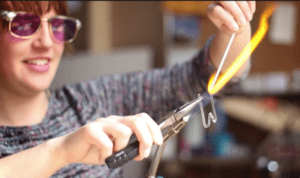
There are more suggestions that can be added to the list, but this is a great start. I hope these tips and prompts are helpful for anyone who wants to hone their interviewing skills (which includes me!).
If I made any obvious omissions, please send me a message and I’ll add some tips to the list ([email protected]). Your feedback is valuable. Thank you and happy interviewing!
About Bia Production:
Bia Production is a full-service video production company in NYC. We create first-rate videos for businesses, corporate clients, nonprofits and artists — that are also budget-friendly. We don’t stop there, however. We also film movies, shows, web series, and documentaries. We’re located in Brooklyn, New York, although we provide our video and filming services throughout the Northeast.

